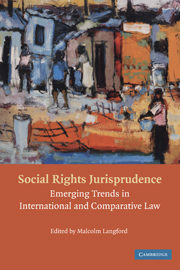Book contents
- Frontmatter
- Contents
- Foreword – Philip Alston
- Preface
- PART ONE OVERVIEW
- PART TWO SELECT NATIONAL JURISDICTIONS
- 4 South Africa
- 5 India
- 6 South Asia
- 7 Colombia
- 8 Argentina
- 9 Brazil
- 10 Venezuela
- 11 Canada
- 12 The United States
- 13 Hungary
- 14 France
- 15 United Kingdom
- 16 Ireland
- PART THREE REGIONAL PROCEDURES AND JURISPRUDENCE
- PART FOUR INTERNATIONAL HUMAN RIGHTS PROCEDURES AND JURISPRUDENCE
- PART FIVE SPECIAL TOPICS
- Notes on Contributors
- Table of Authorities
- Index
- References
8 - Argentina
Some Promising Signs
Published online by Cambridge University Press: 05 June 2012
- Frontmatter
- Contents
- Foreword – Philip Alston
- Preface
- PART ONE OVERVIEW
- PART TWO SELECT NATIONAL JURISDICTIONS
- 4 South Africa
- 5 India
- 6 South Asia
- 7 Colombia
- 8 Argentina
- 9 Brazil
- 10 Venezuela
- 11 Canada
- 12 The United States
- 13 Hungary
- 14 France
- 15 United Kingdom
- 16 Ireland
- PART THREE REGIONAL PROCEDURES AND JURISPRUDENCE
- PART FOUR INTERNATIONAL HUMAN RIGHTS PROCEDURES AND JURISPRUDENCE
- PART FIVE SPECIAL TOPICS
- Notes on Contributors
- Table of Authorities
- Index
- References
Summary
INTRODUCTION
INTRODUCTION: JUDICIAL REVIEW IN ARGENTINA
The judicial system in Argentina is a combination of a U.S.–inspired constitutional framework and a civil law–inspired institutional framework, a model not uncommon in Latin America. The Argentine constitution, passed in 1853, was strongly influenced by the U.S. constitution, with the adoption of federalism and a tripartite partition of government, comprised of an independent executive, legislature and judiciary. Since its inception, the Supreme Court of Argentina has often considered legal precedents handed down by its U.S. counterpart, especially in matters where both constitutions are alike. For example, the Argentine Supreme Court resorted to the Marbury v Madison decision as part of its declaration of its powers of judicial review. Federal judicial review also follows the diffuse system of the United States whereby any judge can interpret the Constitution within the limits of a concrete case, but a declaration of unconstitutionality has effects only for the case where it is pronounced, the Supreme Court being the ultimate interpreter of the federal Constitution.
On the other hand, Argentina drew on the European legal tradition in at least three important aspects. First, the organisation of the judiciary and the offices of the attorney general, public prosecutor and public defender, follow the shape of a permanent and professional continental bureaucracy. Second, procedures are mostly conducted in writing, together with generous possibilities for appeal and the review of previous decisions.
- Type
- Chapter
- Information
- Social Rights JurisprudenceEmerging Trends in International and Comparative Law, pp. 163 - 181Publisher: Cambridge University PressPrint publication year: 2009



